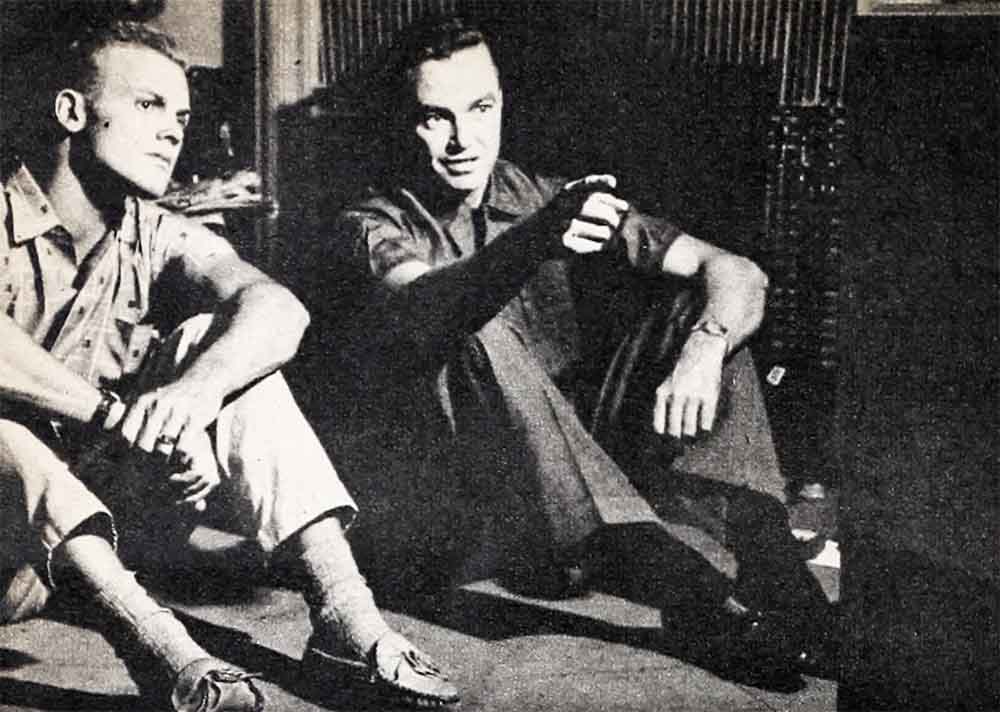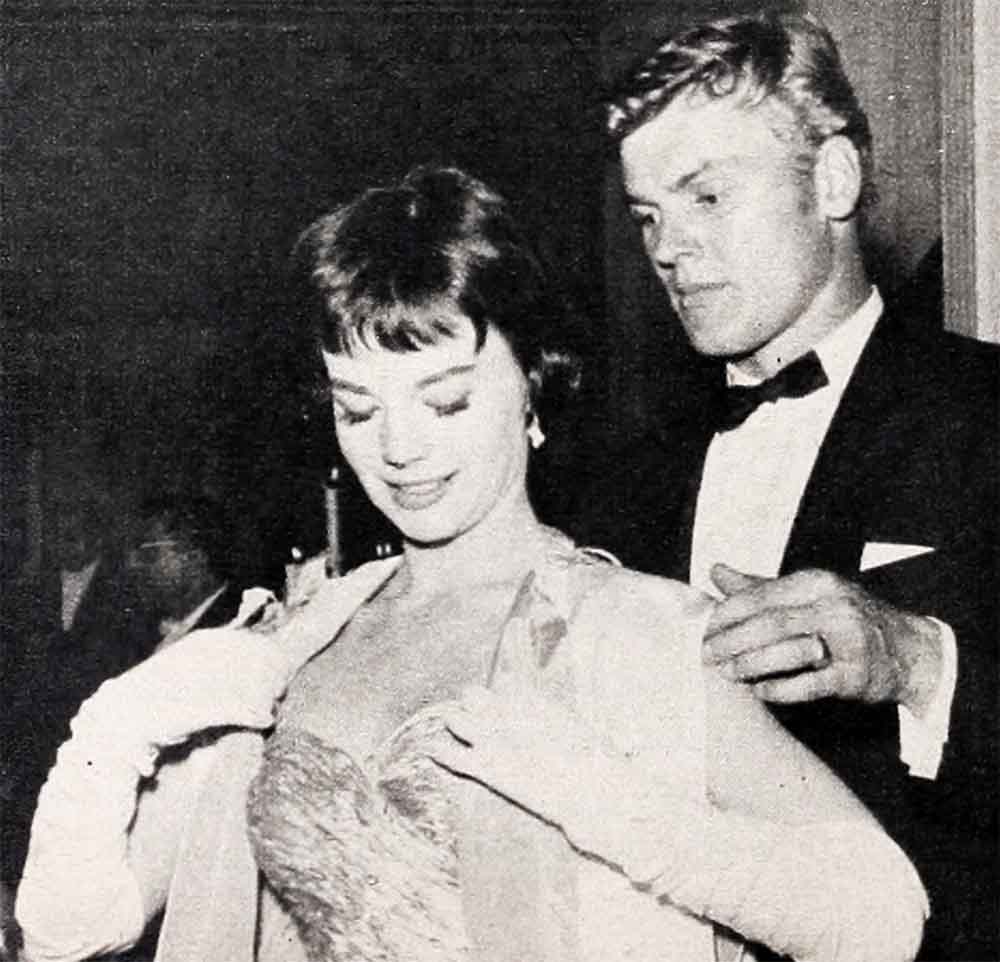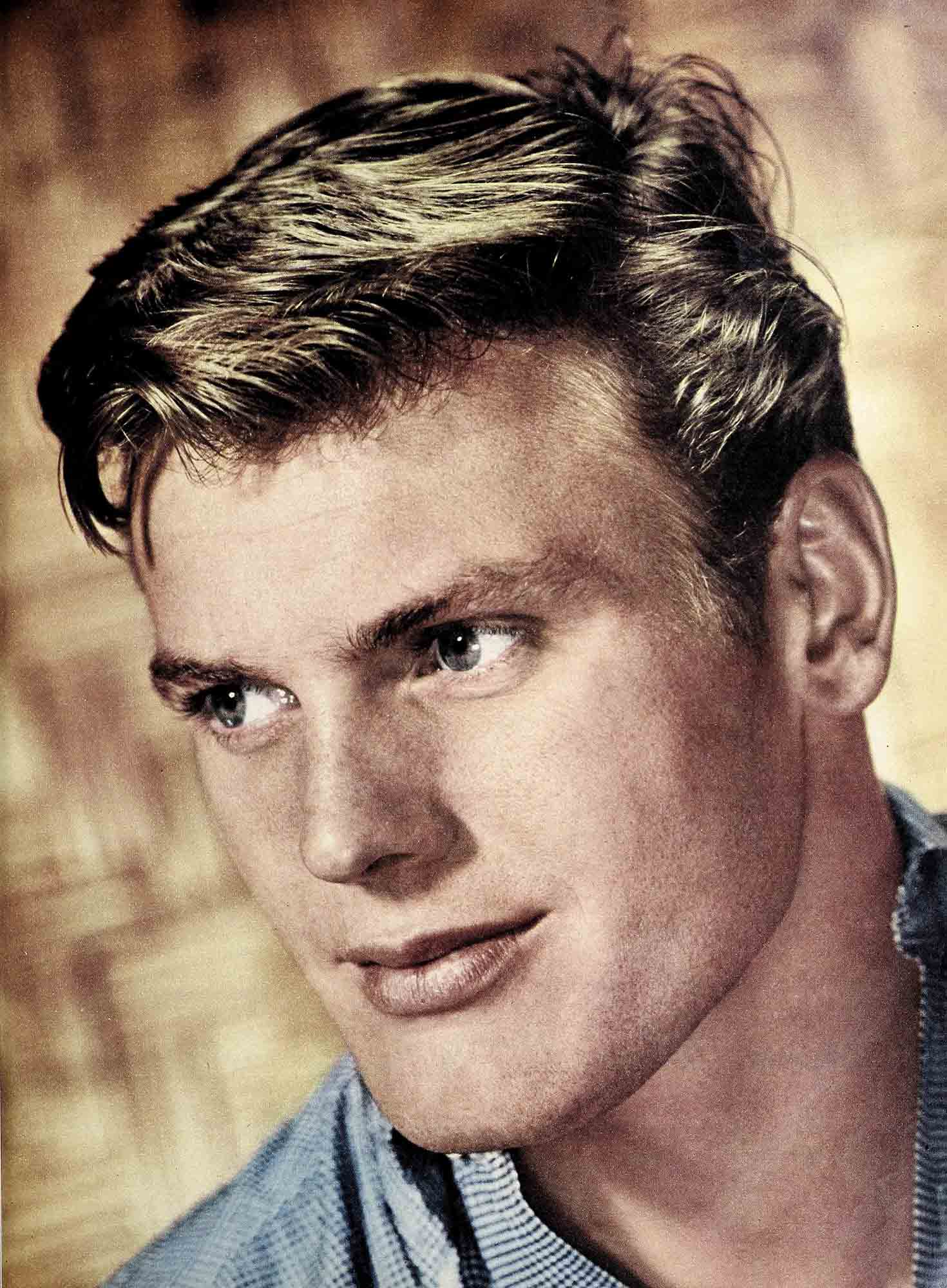
Tab Hunter: Caught In That Tender Trap?
One might wonder if Tab Hunter, Warner Brothers’ star and one of Hollywood’s most popular young actors, ever heard the story about the fond parents who sent a telegram to their son. who was contemplating marriage. The message read: “We rejoice in the news that you are to be married and wish to congratulate you on your wise and admirable choice. Our heartfelt congratulations. Mother and Dad. P.S. Your mother just left the room. Stay single, you blithering idiot.”
Whether or not this incident ever came to Tab’s attention, the fact remains that he is still discouragingly single. Only recently has there been any indication that this condition may change in the forseeable future.
This young actor with the disarming smile and captivating good looks does an amazing amount of thinking. And he is very outspoken on the subject of personal independence. He expresses his views frankly and sincerely. To Tab. a conviction is a rock to stand on in the sea of well meant advice which often engulfs young, inexperienced people. Tab thinks youngsters should find their own ways, without the constant advice of their elders, and should they make mistakes, it will do no permanent harm if they have the intelligence to learn from experience. A free spirit who likes room to move around in, Tab hates to be crowded. Like any well mannered young man, he will listen to advice, but he refuses to take it if he doesn’t agree.
Heretofore, Tab has been most upset by those who have tried to nudge him down the path to the altar. It isn’t that he’s against getting married; he simply wants to do it in his own way, in his own good time.
“I think,” says Tab, “my whole attitude can be summed up by something that happened when I was in high school. I was running around with a lovely girl whom I liked enormously. We were getting along just fine until she began to say, each night when I left her, ‘Don’t forget to call me first thing in the morning.’ I suddenly felt snared—and that was the end of the affair.”
Although this kind of “nudging” may have cut short other budding romances in Tab’s past, there apparently was no trace of it in his emotional life just a few months ago. In some sweetly devious manner (the details are still very obscure), Tab met a girl who is the daughter of a business tycoon in the East. Whether young love flared at the first meeting is not known, nor has her name been divulged. However, it has been learned that the mysterious romance is serious enough to have brought the young lady in question to Hollywood on at least one occasion and caused Tab to fly East twice.

But there seems to be one big obstacle in their potential trip to the altar. The young lady’s father, a man of importance and large affairs, views Hollywood marriages with an unfavorable eye. Consequently, he has decreed that Tab must give up his movie career and become a respectable man of business, presumably in his own financial structure. This is the dilemma Tab faces. Will he forsake his cherished career for love? No one knows. Dick Clayton, who should know, since he is Tab’s agent and closest friend, says quite simply, “I wouldn’t bet a nickel either way.”
On the surface, Tab appears untroubled as he faces this great decision. He still insists that love must be non-possessive. It should, he says, be an infinitely sweet, generous emotion that seeks only a mutuality of interests and expression. It should be tender but never a trap. And, he wisely asks, if it is possessive before marriage, what would it be after the knot is tied? Tab concedes that, in the last analysis, it is the girl who chooses her mate, but he declares that this should be done with subtlety and grace. Men like to think they are running the show, and the sensitive, intelligent girl will encourage this attitude rather than destroy it.
Any man, Tab believes, is conscious of his own limitations and inadequacies. That is why he needs a wife or sweetheart who comforts him even when praise isn’t wholly deserved. It salves his ego and bolsters his self-confidence. “Imagine how an actor would feel,” Tab says, “if after attending a preview of one of his pictures with his wife, she were to say, ‘You certainly laid an awful custard in that one.’ He’d want to cut his throat.
On the other hand, if he’s done a good job, his wife should tell him so. The guy’s spirits would soar and he’d be a better artist, thanks to her enthusiasm.”
Independence belongs to women as well as men, Tab believes. In fact, he admires girls who know their own minds and aren’t afraid to speak them—but not to the extent that they become dominating. No man, he says, wants a clinging vine, but neither does he cherish a companion with a chip on her shoulder. The ideal girl, according to Tab, is one who combines the delectable qualities of sweet surrender with intellectual honesty, courage and gentleness. Nor need a girl be startlingly beautiful. Most physically entrancing women, Tab thinks, are too taken up with their exterior charms to give much thought to the spirit which must burn inside of any truly lovely woman.

When asked if he considers himself to be decidedly independent in spirit, Tab says, “Yes—within the confines of my contract.” He cites an incident which arose when his studio wanted him to do a certain television show. “I read the script and knew I was too young for the part, but my bosses insisted. I worked three days and they took me out. My miscasting was obvious.”
Never one to eat humble pie, Tab does, however, regret his light-hearted attitude when he first entered pictures. Riding horses was then more important than almost anything else and he regarded acting as nothing more than a mild diversion. His agent Dick Clayton, who had known Tab since he was twelve, kept urging him to study, study, study. “It was only when I began to listen to him,” Tab says, “that the seriousness and possibilities of a picture career began to become clear in my mind. That was one bit of advice I’ve always been thankful I heeded.”
Accused by his associates of a rather free-wheeling style with various young actresses, Tab has wended his careless way through the Hollywood garden of love “where they say only peaches grow” and remained singularly unattached. Many writers, plus a few important columnists, steadfastly predicted that his friendship with Lori Nelson would lead to a journey down the middle aisle. But they only shot their cupid’s arrows into the sun. The lovely Lori and Tab were seen together often, then only occasionally. He still takes her out, but more rarely now. Why? The columnists can only guess, since neither Tab nor Lori has made any statement.
While making “The Burning Hills” at Warners’ with Natalie Wood, a pert, eighteen-year-old with an audacious and sometimes sharp tongue in her pretty head, Tab found a personality as independent as his own. Natalie has an impish determination to stay in the spotlight. She and Tab work well together, but with a kind of guarded alertness, each watching the other warily as the scenes unfold. However, this has in no way lessened their mutual liking and respect. Indeed, they go out together occasionally and have a good time.
While Tab is now a dedicated actor, he admits that taking advice from others with more experience was the hardest lesson he had to learn. His first important picture, “Island of Desire,” with Linda Darnell, was not a conspicuous success despite the friendly assist given him by Linda. She liked Tab and saw potentialities of which he himself was not yet aware. But still Tab couldn’t banish from his mind the feeling that picture-making was something of a lark.
Dick Clayton tried to convince him that “life is real, life is earnest,” but Tab only smiled and went on spending all his spare time riding the horse he had just bought. In a later film, “The Return to Treasure Island,” he was so bad that Clayton frankly told him it would be seen only in drive-in theatres. “I’d be ashamed,” Dick said, “if it appeared anywhere else.”

Even this failed to impress Tab greatly. It took another year, and a harrowing experience on a television show, to convince him that a winning grin and the ability to make people like him were not enough. It came about in this fashion: Clayton lined up a good role for Tab on a TV program, “The Jim Piersol Story.” On being told about it, Tab nodded almost indifferently. That seemed to be that. On the last day of rehearsal, however, the enormous fact that he was to be watched, not by hundreds but by millions of critical people, broke over Tab’s mind like a thunderclap. Waves of panic flooded through him and in terror he turned on Clayton and shouted, “You got me into this! I’ll never be able to go through with it. You’re fired!”
Clayton, himself a former actor and a man of instinctive sympathy and understanding, tried his best to reassure him. “No,” Tab moaned. “It’s all your fault. You should never have put me in such a spot.”
The hour for the final rehearsal arrived and Tab, shaking like a leaf in a high wind, went through his lines. And then something happened. Whether it was the inspiration of pure fright or the guiding hand of his guardian angel, Tab never knew. But one fact was certain: his interpretation of the role was excellent.
In spite of Clayton’s enthusiastic assurance that he had done a fine job, Tab was still convinced that Clayton had betrayed him. “I don’t believe you,” he muttered. “And you’re still fired.”
That night, still trembling, Tab faced the revealing eye of the television camera which was sending his every movement into the living rooms of people all over the nation. But Clayton’s last words, “You’re good. Remember that,” remained in the back of his mind. An hour later it was over and the director, the actors and Clayton knew that Tab had given a superb performance. He stumbled back into his dressing room, however, still convinced that he had flopped dismally. It was only when telegrams began to pour in, among them one from Warner Brothers, that he turned with a weak grin to Clayton and said, “You’re rehired.”
One of the faults which has troubled Dick Clayton in his dealings with his many-faceted young protege, was Tab’s complete inability to keep any of the money he earned. “He’d buy fabulous presents for everyone he liked,” Dick says, “his mother, Lori Nelson, me and many others. He was always broke. I finally pointed out to him that James Dean, whom he admired tremendously, had employed a business manager. That did it. A few days later, Tab told me Dean’s manager was now his also. It’s been tough on the boy, though. All his impulses are generous and it’s hard for him to remain rigidly within an allowance.”
One of the qualities close friends admire most in Tab is his unswerving loyalty. For example, recently on the Warners lot a young actress who Tab believed had the abilities of a star, was noticeably being overlooked. Impulsively, Tab went to one of the top studio brass and staged one of his better performances. “This girl, Jan Chaney, has everything,” he said. “She’s got a flame inside her and you’d better give it a chance to burn or some other studio will.”
That same afternoon, Jan was called up for an extensive screen test and Tab, hearing about it, accompanied her personally to the hairdresser and make-up artist. “This girl is a friend of mine,” he said. “Be good to her.”
Tab was born Arthur Gelien in 1931, in New York City. Two years later, he, his mother and three-year-old brother moved to San Francisco. Mrs. Gelien, who has always had an important influence on Tab’s life, supported her sons by working as a trained nurse and physiotherapist for the Matson Steamship Line.
In 1946, when he was fifteen, Tab hoodwinked the Coast Guard into accepting him. While receiving special training at Groton, Connecticut, he attended plays in New York City. The sight of talented people on the stage, doing what seemed to come naturally, excited Tab’s imagination and prompted his first thoughts of making the stage his future career.
A year later, the Coast Guard discovered they’d been deceived about his age and forthwith returned Tab to civilian life. It was then that he turned his attention to ice skating, of all things. Returning to San Francisco, Tab got a job as a sheet-metal worker, but devoted most of his spare time and money to skating.
In 1949, Tab gave up his job as sheet-metal worker to accept a two-word role in a film called “The Lawless.” Although his two words wound up on the cutting room floor, his tiny performance brought him once again to the attention of his old friend, Dick Clayton who, by this time, was an actors’ agent. Deciding that Arthur Gelien was no handle for a future film star, and remembering that his friend liked riding hunters and jumpers and must be tabbed something, Clayton and another agent decided to name him Tab Hunter.
The new handle was productive of nothing but hunger. For two years Tab worked at various jobs, none even remotely related to pictures. His break finally came when actor Paul Guilfoyle learned that director Stuart Heisler was looking for a young actor to play a shipwrecked Marine in “Island of Desire.” Guilfoyle remembered a brief backstage conversation he’d had months earlier with a very young actor and thought he might do. He located Tab and introduced him to Heisler. The director took one look at the boy’s eager face and accepted him on the spot to play opposite Linda Darnell. “Island of Desire” was followed by others, including “Gunbelt,” “The Steel Lady” and “Return to Treasure Island.” Then, under Clayton’s careful guidance, Tab was signed by Warner Brothers. Since then he has made “Battle Cry,” “Track of the Cat,” “The Sea Chase” and “The Burning Hills.”
Now, at twenty-four, Tab faces the most important independent decision he will probably ever be called upon to make. It is only natural to speculate on what his action will be. Will he give up his career for marriage? Or will he remain a dedicated actor?
Almost anyone can find some measure of happiness in marriage, but only the chosen few can hitch their wagons to a star and shine brightly in the movie world. Still in all, let us remember that kings have relinquished empires for love—and Tab, for all his bright and shining talent, is no king. He is just a boy with a glorious future. Just how glorious that future will be, career and marriage-wise, only time—and Tab—can decide.
THE END
It is a quote. PHOTOPLAY MAGAZINE JULY 1956




